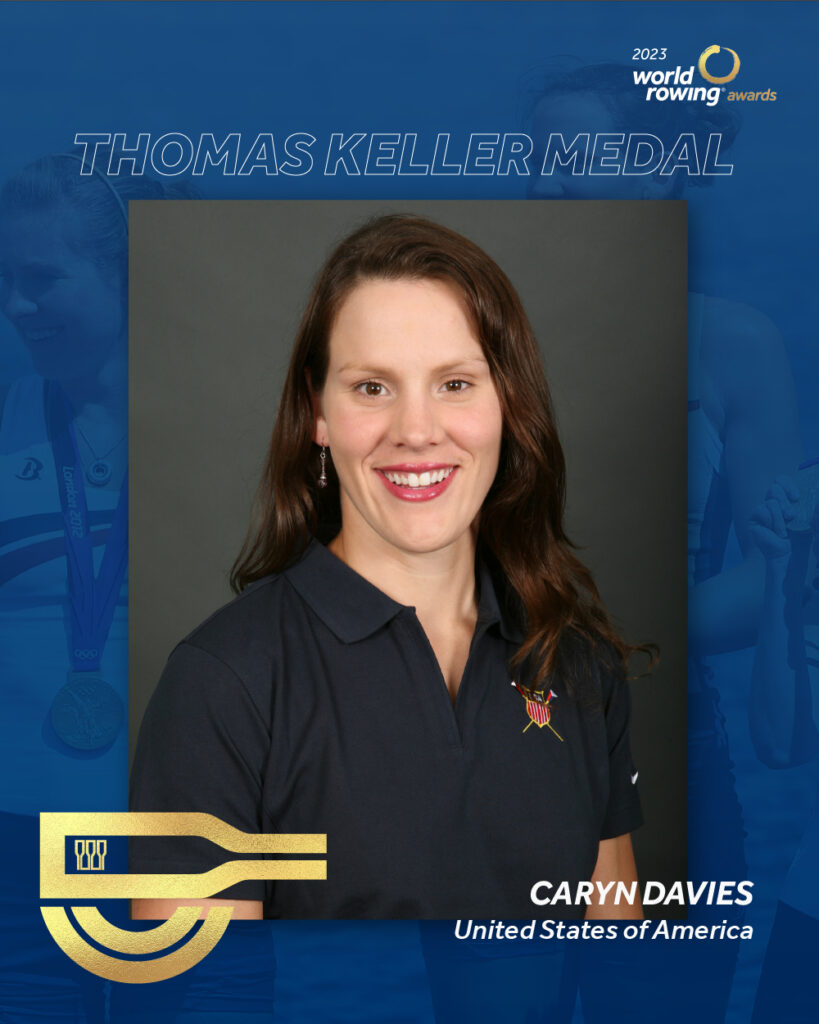
13 Dec 2023
Caryn Davies: "You never know what people will remember about you"
In May of 2013 thousands of spectators were treated to the remarkable spectacle of the men’s first eight from Pembroke College Oxford racing with an American woman in the key stoke seat. Extraordinarily, Caryn Davies and her crew went on to win the Summer Eights that year. Those who knew her as the most influential American oarswoman of the 21st century – both on and off the water – would of course not be surprised. By then, Davies had won medals in three Olympics – two of them gold – in 2008 and 2012. Moreover, she had already become the talisman of the Iconic US women’s eight. After an international senior career that stretched from 2002 to 2019, It is fitting that Davies has been awarded the 2023 Thomas Keller medal.
 For eleven years between the 2006 world championships, up to the Rio Olympics, the American women’s eight, won gold every single year. And while her legal studies and work as a lawyer kept Davies out of some of those crews, Tom Tehaar, who coached the American women from 2001 to 2021, had no doubt about Davies’ influence on that incredible run. ‘I’ve learnt more about rowing from Caryn than from any other athlete I’ve coached.’ And Tehaar went on to say that: ‘It’s right that Caryn’s achievements have been recognised by the award of the Thomas Keller medal.’
For eleven years between the 2006 world championships, up to the Rio Olympics, the American women’s eight, won gold every single year. And while her legal studies and work as a lawyer kept Davies out of some of those crews, Tom Tehaar, who coached the American women from 2001 to 2021, had no doubt about Davies’ influence on that incredible run. ‘I’ve learnt more about rowing from Caryn than from any other athlete I’ve coached.’ And Tehaar went on to say that: ‘It’s right that Caryn’s achievements have been recognised by the award of the Thomas Keller medal.’
Davies’ first of four world championship gold medals came in Seville in 2002. By then it was already clear that Davies was an amazing team-player. Her teammates have unsurprisingly been fulsome in their praise for Davies’ many qualities, particularly that of taking new athletes under her wing and helping them understand how best to move a boat. Double Olympic champion Caroline Lind said: ‘I learnt so much rowing in the ‘7’ seat behind Caryn Davies. She’s one of the all-time greats in the US. What I learned from Caryn was how it feels to set a great rhythm. She’s like a metronome.’ The young Kara Kohler explained how influential Davies was to er development in 2012. ‘Not only did Caryn impart her rowing wisdom to me, but she also took me under her wing and helped me navigate my first year on the team – something for which I will always be grateful.’ Kohler went on to win a bronze medal that year.
At 1m.90 Davies has a tall willowy physique, which lent itself to a fluid and graceful stroke, both in the boat and on the erg. She also became a great sculler while spending time in Tasmania, early in her rowing career. In Gifu in 2005, she raced in the final with the US women’s quad. But with that poise came a fierce toughness as one of her teammates recalled: ‘we were stounded at her ability to make boats faster, especially when sitting at stroke.’ It was leading her crew from that seat that Davies showed a rare talent.
In a system where selection for the US women’s eight was so tough, Davies consistently showed she had the resilience to stay at the top. This was despite taking a career break for the 2009 and 2010 seasons. The legendary US coach Kris Korzeniowski said: ‘What I admire about Caryn is her ability to combine training and racing at the highest level with the pursuit of the highest levels of intellectual achievement. She is exceptional.’
In 2015 while studying for an MBA at Oxford, Davies stroked the Dark Blue women to victory on the first women’s Boat Race, held on the famous Championship Course. Despite returning to her career as a lawyer, Davies was still determined to make a return to the team for the Tokyo Games. And the lawyer from Ithica, New York raced in the US women’s four in the 2019 world championships and helped them qualify that boat for the Olympics.
Off the water Davies put her energy into representing athletes. She served as Vice President of the U.S. Olympians and Paralympians Association. In fact, it was Davies’ work that got the Paralympians incorporated into the Association. The hard-working lawyer even completed the necessary paperwork. Her determination to give back to the sport was seen when she volunteered for the role of Team USA’s Athlete Service Coordinator in the Pyeongchang 2018 Olympic Winter Games.’
Davies did not have things her own way during her career. She was hopeful of making the Tokyo team. But with COVID interrupting everything and up against athletes half her age, Davies could not quite make the 2021 Tokyo team. Nevertheless, Tehaar said: ‘Despite her disappointment Caryn could not have been more supportive of the team that went to the Games.’
Davies’ medal not only stands as a testament to her remarkable career but also to the achievements of those women who made the U.S> eight such an iconic boat in our sport.

